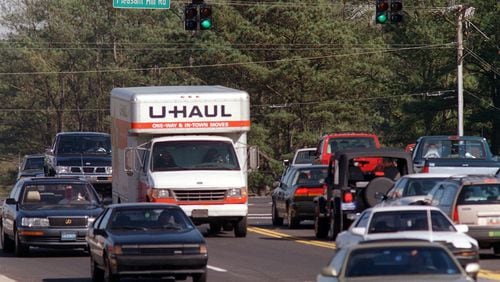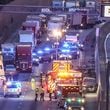The head of the agency that trains and disciplines Georgia law enforcement officers says the state needs to improve officer training following an Atlanta Journal-Constitution/Channel 2 Action News investigation that exposed questions about deadly police shootings.
“It puts in our face those raw hard numbers that makes us say, ‘Whoa, we might need to look at this thing in a different way’,” said Peace Officer Standards and Training (POST) Council Director Ken Vance.
An AJC/Channel 2 investigation compiled the details on all 184 deadly police shootings in the past five years, conducting more than 100 interviews, obtaining more than 500 public records and analyzing thousands of pages of incident reports, investigative files and court records.
The investigation did not include the fatal shooting of a Douglas County man, who became the 29th person killed by police this year when he was shot by a Douglas sheriff's deputy Monday night. Relatives said Bobbie Daniels was trying to diffuse a confrontation between police and his son. The Georgia Bureau of Investigation will review the shooting.
Vance says one of the most staggering findings from the AJC and Channel 2 was that 90 Georgians, nearly half of all of the cases reviewed, were either unarmed, shot in the back, or both.
“It tells me that we’ve got to change our training dynamic. We need more scenario-based training,” said Vance, particularly with respect to citizens who are mentally ill. “Everything an officer does at the end of the day falls back to training in most cases.”
The state already requires police officers to undergo deadly force training each year or lose their powers of arrest.
This AJC/Channel 2 investigation was the first comprehensive review of all available records in Georgia, and Vance says state leaders are already talking about how to utilize the information revealed.
“I think Georgia is committed to doing the right thing,” said Vance. “It is not easy to be a law enforcement officer. I don’t know how we’re recruiting people anymore.”
The majority of the 184 shootings analyzed involved dangerous situations with people who were said to be threatening the officers or others with guns or other weapons.
About one in four had discharged a firearm before or during the fatal encounter with police.
Vance says he overwhelmingly believes most officers do the right thing, and that most of the deadly officer-involved shootings are justified.
However, he supports an upcoming legislative effort by Georgia’s Prosecuting Attorneys’ Council to limit the special treatment officers get when they face a grand jury.
A proposed bill would allow accused officers to appear in the grand jury room, but only to testify, then they would have to leave.
Also, their statements would be subject to questioning by grand jurors and prosecutors.
Currently, Georgia is the only state where officers can remain in the grand jury room for the entire proceeding, hear all of the evidence against them, and then make an unchallenged closing statement.
“That’s troubling, that’s really troubling,” said Vance, “Have we had some bad shootings in Georgia? Yes. Will we have some in the future? Yes. But I hope we have less, everybody at our level hopes we have less. This does not make us look good.”
He says prosecuting the few bad shootings would make the public more trusting of the majority of cases, which are justified.
“How did we get to this point where that kind of thing occurred? That’s where the training needs to take place,” said Vance, “And then be transparent with a good third-party investigation after it’s over with, and I think we build back that public trust.”
Another police official who wants to “enhance that public trust” is DeKalb County Police Chief Cedric Alexander.
“We’ve got to go back and look at our policies around police-involved shootings. We’ve got to go back and look at these same items that the state said they’re going to take (up) the first of the year, looking at grand juries,” said Alexander, who serves on a national commission on policing created by President Obama in the wake of the riots in Ferguson, Mo. “We’re also going to have to take a look at how we train. We also need to take a look at who it is we recruit as police officers.”
Louis Dekmar, police chief in LaGrange, said the fatal shootings in the AJC/Channel 2 report represent only a tiny portion of the countless encounters police officers have with the public every day, most of them harmless, many of them dealing with violent criminals, but each one presenting a possible risk to the officer and the public.
“It makes it sound like the police are driving up and down looking for opportunities to shoot folks,” the chief said. “In fact that’s the rare exception.”
And the AJC’s major finding on the race of people shot — that police fatally shoot black Georgians at a rate twice that of white Georgians when population is considered — isn’t the police’s fault, Dekmar said.
“The police go where the crime victims are,” he said. “For a lot of reasons police are not responsible for, the African-American community is impacted by crime at a significantly higher rate than the white community, and as a result they’re going to be there more.”
The AJC’s finding that nearly half of those fatally shot were unarmed or shot in the back doesn’t mean the shootings weren’t justified, said Howard Sills, sheriff of Putnam County.
“Just because a person’s not armed doesn’t mean you’re not in fear,” said Sills, a past president of the Georgia Sheriffs Association.
Read more about police shootings in Georgia at investigations.ajc.com/overtheline/.





